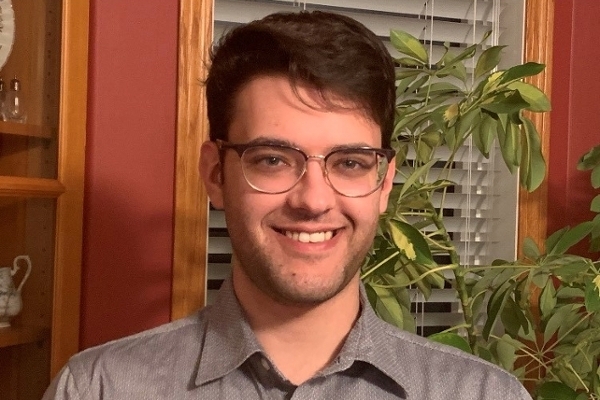
JSGS Student Wins Virtual Hackathon
Congratulations to Master of Public Policy student Canute Rosaasen and his partner, Mahesh Rachamalla, on placing first in the University of Saskatchewan’s first virtual hackathon, EcoHack Connect!
By Emilie Neudorf, JSGS Communications and Marketing AssistantEcoHack is an immersive multi-day experience, hosted by USask in partnership with the City of Saskatoon, in which 14 teams of students from various degree programs collaborated using a rapid-iteration design model to generate viable solutions to a problem that fits within the City of Saskatoon's theme of “The Social Impacts of Climate Change.” A panel of judges shortlisted the submissions to the three finalists, including Rosaasen and Rachamalla’s project, Saskatchewan Green Innovation Organization. After tallying the votes that each of the top three projects received, Saskatchewan Green Innovation Organization won the grand prize.
“I was honestly surprised that we won—mainly, because when you think of the words ‘eco hack’ you really think of a flashy tech solution, like an app or some cutting edge energy production method,” said Rosaasen. “It was interesting that we won with essentially a pure policy solution–I think it shows the value of reorganizing and reallocating extant resources, rather than trying to continually create novel tech solutions.”
Canute Rosaasen and Mahesh Rachamalla produced a video that outlines their project, Saskatchewan Green Innovation Organization. Their project proposes that making connections between community-based organizations and the University of Saskatchewan has the potential to reduce costs and increase energy efficiency for community organizations that serve Saskatoon’s most vulnerable populations.
To achieve this goal, Saskatchewan Green Innovation Organization would serve as an intermediary between experts and organizations. They would attend meetings with the Safe Community Action Alliance (SCAA) community-based organizations that have plans for infrastructure projects in their immediate future and connect them with students from the College of Engineering, College of Arts & Science, or the Johnson Shoyama Graduate School of Public Policy.
The Saskatchewan Green Innovation Organization would be able to reduce the cost of energy for community-based organizations by providing direct connections to new research and creative minds from the University of Saskatchewan. For example, in their video, they stated that the Lighthouse in Saskatoon currently spends up to 10% of their annual expenditure on utilities. By connecting the Lighthouse with experts in energy efficiency before a major infrastructure project, some of their utility expenditure could be reallocated to address their goals for the Saskatoon community.
“Events like EcoHack bring out the fun in doing graduate school—it’s easy to get caught in a mindset that you read and you write a report, you read and you write an essay—that isn’t the whole point, though,” said Rosaasen. “You’ve learnt something cool and useful. Sign up for EcoHack, write for the CSIP blog, dive into case competition—there are a dozen forums to apply the things we learn in cool, novel, and fun ways.”
View Canute and Mahesh’s proposal for the Saskatchewan Green Organization here.

